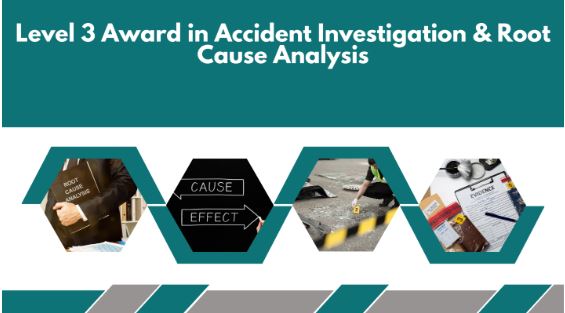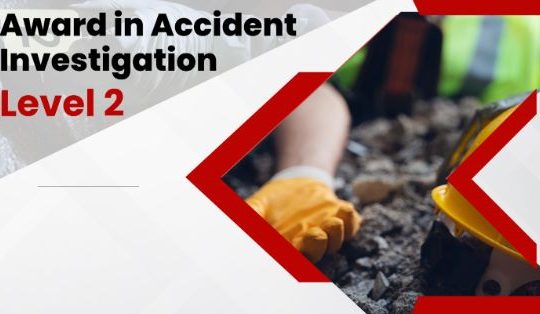
Level 3 Award in Accident Investigation & Root Cause Analysis
Course Overview
The Level 3 Award in Accident Investigation & Root Cause Analysis is a comprehensive qualification designed to empower professionals with advanced skills in accident investigation and the systematic identification of underlying causes. This course enables participants to investigate workplace incidents effectively, identify contributing factors, and implement corrective actions to enhance organizational safety. Ideal for safety officers, supervisors, and managers, the course provides a structured approach to incident investigation and equips learners with practical tools to improve workplace safety culture.
Benefits
- Enhanced Analytical Skills: Gain advanced knowledge in identifying the root causes of accidents and incidents.
- Improved Safety Standards: Promote proactive safety measures to prevent future incidents.
- Legal and Regulatory Compliance: Understand the importance of compliance with workplace safety laws and regulations.
- Career Advancement: Develop specialized skills that enhance professional credibility and open up career opportunities in health and safety management.
- Organizational Value: Contribute to building a safer workplace, reducing downtime, and improving employee morale.
Learning Outcomes
By completing this course, participants will:
- Gain in-depth knowledge of the accident investigation process and its role in workplace safety management.
- Master advanced techniques for conducting root cause analysis and identifying key contributory factors.
- Learn to collect, analyze, and interpret data from incident scenes effectively.
- Understand how to develop actionable recommendations and implement corrective measures to prevent recurrence.
- Be able to prepare and present professional investigation reports for internal and external stakeholders.
Study Units
- Principles of Accident Investigation
- Importance of investigating workplace incidents.
- Legal and ethical considerations in accident investigation.
- Advanced Techniques in Evidence Collection
- Documentation of accident scenes and collection of physical evidence.
- Witness interviewing techniques and effective information gathering.
- Root Cause Analysis Tools and Techniques
- Methods such as Fault Tree Analysis (FTA), Bowtie Analysis, and the "5 Whys" approach.
- Differentiating between immediate causes and root causes.
- Developing Preventive Measures
- How to propose corrective and preventive actions.
- Measuring the effectiveness of implemented solutions.
- Professional Reporting and Communication
- Writing clear and concise investigation reports.
- Effective presentation of findings and recommendations to stakeholders.
Career Progression
The Level 3 Award in Accident Investigation & Root Cause Analysis prepares participants for advanced roles in health and safety management, including:
- Accident Investigation Specialists: Focus on detailed investigations to improve workplace safety.
- Health and Safety Managers: Oversee comprehensive safety programs and incident investigations.
- Risk Management Professionals: Develop and implement strategies to reduce workplace hazards.
- Safety Trainers: Educate teams on accident prevention and investigation techniques.
Compliance Officers: Ensure adherence to workplace safety regulations through effective oversight.
Our assessment process is designed to ensure every learner achieves the required level of knowledge, skills, and understanding outlined in each course unit.
Purpose of Assessment
Assessment helps measure how well a learner has met the learning outcomes. It ensures consistency, quality, and fairness across all learners.
What Learners Need to Do
Learners must provide clear evidence that shows they have met all the learning outcomes and assessment criteria for each unit. This evidence can take different forms depending on the course and type of learning.
Types of Acceptable Evidence
Assignments, reports, or projects
Worksheets or written tasks
Portfolios of practical work
Answers to oral or written questions
Test or exam papers
Understanding the Structure
Learning outcomes explain what learners should know, understand, or be able to do.
Assessment criteria set the standard learners must meet to achieve each learning outcome.
Assessment Guidelines
All assessment must be authentic, current, and relevant to the unit.
Evidence must match each assessment criterion clearly.
Plagiarism or copied work is not accepted.
All learners must complete assessments within the given timelines.
Where applicable, assessments may be reviewed or verified by internal or external quality assurers.
Full learning outcomes and assessment criteria for each qualification are available from page 8 of the course handbook.
Top Courses
No results found.
Related Courses
Let's Get in touch
Deleting Course Review
Course Access
This course is password protected. To access it please enter your password below:



